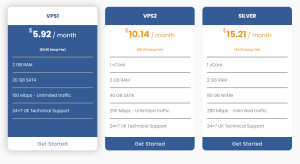Table of Contents
In the ever-evolving world of web hosting, making the right decision for your website’s hosting needs can be critical to ensure optimal performance and reliability. Shared hosting might have served you well when you first started your website, but as your online presence grows, you may find yourself outgrowing the limitations of shared hosting. This is where Virtual Private Server (VPS) hosting comes into play. In this comprehensive guide, we will explore the reasons and indicators that suggest it’s time to upgrade to VPS web hosting, along with other related sub-topics.
Understanding the Basics of VPS Hosting
What is VPS Hosting?
VPS hosting, or Virtual Private Server hosting, is a middle-ground solution between shared hosting and dedicated hosting. It involves using virtualization technology to create isolated virtual machines on a single physical server. Each VPS operates independently, with its dedicated resources and operating system, providing a more secure and flexible hosting environment.
How Does VPS Hosting Work?
In VPS hosting, a physical server is divided into multiple virtual servers using virtualization software. Each virtual server operates independently and has its own dedicated resources, including CPU, RAM, storage, and bandwidth. This isolation ensures that the performance and security of one VPS are not affected by other VPSes on the same physical server.
Signs It’s Time to Upgrade VPS Web Hosting
- Increased Website Traffic: As your website gains popularity, the traffic it receives can strain the resources of a shared hosting environment. Slow-loading pages and frequent downtime can result from this increased demand.
- Performance Issues: If your website experiences performance issues like slow page loading, unresponsive scripts, or database errors, it’s a sign that your current hosting plan may not be sufficient for your needs.
- Security Concerns: VPS hosting offers better security compared to shared hosting. If you require enhanced security features, such as custom firewall configurations, isolated environments, and regular security updates, it might be time to switch to VPS hosting.
- Customization Needs: Shared hosting plans often limit your ability to install custom software or configure server settings. With VPS hosting, you gain full root access, allowing you to customize your server environment as needed.
- Resource Scalability: VPS hosting allows you to scale resources like RAM, CPU, and storage to meet the changing demands of your website. If your website’s resource requirements vary, VPS hosting provides flexibility.
Other signs to note when it’s time to Upgrade to VPS Web Hosting Include the following
•If your site takes more than 3 seconds to load – it’s time for VPS
Loading speed has a crucial role in how your site will rank. If you want your website to rank well, you need a faster hosting provider or one that will load your site in less than 3 seconds. Shared hosting is fast, but VPS has more resources and high-performance hardware. If your site takes more than 3 seconds to load, purchase a VPS because you might lose visitors in a second.
• If your site is running low on space and resources, it’s time for an upgrade
If you want your site to grow, attract more visitors, and all your apps to run smoothly, you need to have a hosting provider that offers more resources, like multiple CPU cores, more RAM, and SSD storage. VPS has a lot more resources than shared hosting, so consider upgrading.
• You want more flexibility and freedom to make your vision come to live
Innovation is what brings success to this business. People who just started in the business love to be creative to create their perfect website. Unfortunately, if those people use shared hosting, they’ll get frustrated because they won’t get the flexibility or freedom to do what they want. While shared hosting has a lot of restrictions, VPS has cutting-edge technology and will allow you to customize even your content management system.
• Get VPS if you want more robust security for your site
Shared hosting has multiple users hosting their websites on shared servers. The server’s security may be affected since there’s a massive amount of data in that shared server. On the other hand, VPS users operate independently in an isolated environment and can install firewall restrictions and configure more security rules to ensure top-notch security.
• VPS is a must for ecommerce websites
It doesn’t matter if your ecommerce site is big or small; you need to pay the extra money and invest in a virtual private server. By upgrading to VPS, you will have better uptime, improved performance, excellent security, better reliability, and dedicated IPs. If you want your ecommerce site to be successful and get your income, invest in VPS.
If you’re ready to get an upgrade, you can try purchasing a VPS plan from DaManager, an excellent Web Hosting Company. DaManager offers affordable VPS plans that contain unmanaged performance, security and updates, expandable RAM and storage, unlimited bandwidth, unlimited traffic, SSDs, SSL, and unlimited domains. The most affordable DaManager VPS plan will cost you $17/month.

Benefits of VPS Hosting
- Improved Performance: Dedicated resources mean faster load times and more reliable performance, even during traffic spikes.
- Enhanced Security: Isolation from other users on the same server reduces security risks. Custom security configurations provide better protection against threats.
- Full Root Access: VPS hosting grants you complete control over your server’s settings and software installations.
- Scalability: Easily upgrade or downgrade resources based on your website’s requirements, ensuring cost-effective scalability.
- Isolation: Your VPS is not affected by the activities of other users on the same physical server, reducing the risk of resource contention.
Choosing the Right VPS Hosting Provider
- Comparing VPS Hosting Plans: Research different VPS hosting providers and their plans. Compare factors like resource allocation, pricing, and support options.
- Considerations When Selecting a Provider: Evaluate factors such as uptime guarantees, customer support quality, data centre locations, and server management options.
- Managed vs. Unmanaged VPS Hosting: Decide whether you need a managed VPS, where the hosting provider handles server management, or an unmanaged VPS, where you have full control and responsibility.
Migrating to VPS Hosting
- Pre-migration Checklist: Plan your migration carefully, including backing up your data, selecting a suitable VPS plan, and preparing your website for the move.
- The Migration Process: Follow a step-by-step migration process, ensuring minimal downtime and data integrity.
- Post-migration Optimization: After migrating, optimize your VPS settings and configurations for the best performance and security.
Optimizing VPS Hosting Performance
- Server Management Tools: Learn about server management tools and control panels that can simplify server administration.
- Content Delivery Networks (CDNs): Implement CDNs to distribute content globally and reduce load times.
- Caching Strategies: Utilize caching techniques to speed up page rendering and reduce server load
- Regular Backups: Set up automated backup solutions to protect your data and ensure quick recovery in case of issues.
Cost Considerations
- Understanding Pricing Structures: Explore the various pricing models, such as monthly, annual, or pay-as-you-go, and choose the one that suits your budget.
- Budget Planning: Consider the total cost of ownership, including server management and third-party services.
Common VPS Hosting Challenges
- Resource Overuse: Be mindful of resource allocation and avoid overloading your server.
- Technical Expertise: Acquire the necessary technical knowledge to manage your VPS effectively or opt for managed hosting with support.
- Maintenance Responsibilities: Understand the maintenance tasks required, such as updates, security patches, and backups.
About HostAdvice
HostAdvice is a web hosting comparison engine that provides web hosting providers comparisons based on user reviews. Since 2014, when we started this business, our experts have written and published more than 4000 reviews, and we have received more than 65.000 user reviews.
We have been dedicated to helping individuals and businesses find the perfect hosting solution that perfectly fits their needs. Besides expert reviews, we also write and publish excellent how-to guides on tech-related subjects.
Conclusion
In conclusion, upgrading to VPS hosting is a logical step for website owners experiencing increased traffic, performance issues, security concerns, customization needs, or scalability requirements. By understanding the signs, benefits, and migration process associated with VPS hosting, you can make an informed decision that ensures your website’s success and growth.
Remember that the right time to upgrade to VPS hosting is when your website’s needs and demands surpass the capabilities of shared hosting, and you are ready to take control of your hosting environment for improved performance, security, and flexibility.
Upgrade to VPS hosting today with DaManager and provide your website with the resources and support it needs to thrive in the online world.
And if you are an eCommerce shop owner who wants to stay in the game, a VPS is a must! Check out Da-Manager’s review on HostAdvice
This article was originally published in 10 May 2022. It was most recently updated in December 7, 2023 by Isah Progress























